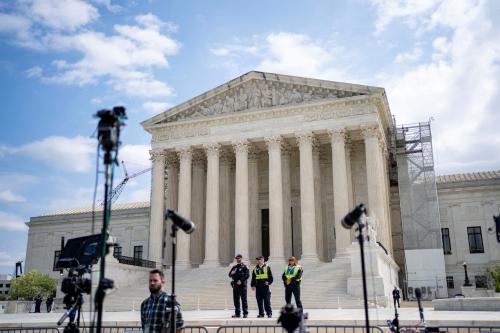

While a majority of federal employees report that they are proud of their jobs and convinced that they contribute to their organization’s mission, a near-equal number are frustrated by the ineffective reforms and scarce resources which define their workplace, according to a new report released by the Brookings Institutions’ Center for Public Service today.
By almost every indicator, the federal government does not give its 1.8 million civil servants the resources to do their job well. Far too many employees must succeed against the odds,” states Paul C. Light., author of the report What Federal Employees Want From Reform and Director of the Center for Public Service. The report is based on a first-of-its-kind survey of 1,051 federal government workers conducted between February 7th and June 1st, 2001. Federal employees were contacted at home and given a rare chance to talk candidly about their work without a supervisor looking over their shoulder.
“The federal government workforce has endured decades of downsizing, bureaucrat bashing, increasing workloads, and pay and hiring freezes,” comments Light, “Federal employees have witnessed countless reforms over the past thirty years, and still the problems persist.”
Federal employees register mixed opinions on past reform efforts. When asked whether their organizations had been reformed in the past half decade, 73% of federal employees responded affirmatively. Only 42% reported that these reforms had made their jobs either somewhat or a lot easier to perform. Comparatively, an equal sample of private sector employees responded that they had been subject to less, but more successful, reform. Fifty-six percent of private sector employees said that their organizations had been reformed in the past five years, but 59% characterized these actions as having the effect of making their jobs somewhat or a lot easier to perform.
Previous efforts toward reinventing government were awarded similarly mixed reviews. While 67% of federal employees reported that efforts to reduce fraud, waste, and abuse had been very or somewhat successful, nearly that same number (58%) categorized attempts to measure government results as not too successful or not successful at all.
Over half of the respondents report that the government needs to provide its employees with the tools to do their jobs well. Federal employees cited the need for access to new technology, the lack of training, and the damage caused by past reforms. According to one employee, the organizational processes have been reformed “to the point that nothing really works. We ought to either reverse the reforms, or reform the reforms so they actually work.”
Respondents are skeptical of the federal government’s ability to recruit and retain talented people — only 19% of respondents said that their organizations do a good job of recruiting talented people. A quarter of federal employees encouraged the government to work harder at recruiting and training. “These employees are worried about renewing the public service,” Light states. “They recognize the need to attract new talent and to evaluate the personnel currently in place.”
Federal employees also cited rewards and discipline and the need for a greater focus on organizational mission as targets of reform. “These are not the recommendations of a selfish, indulgent, job security-conscious workforce,” Light says. “The vast majority are merely asking for the basic tools to do their jobs well and to be recognized for doing so.”
ABOUT THE SURVEY AND THE CENTER FOR PUBLIC SERVICE:
The survey of 1,051 federal employees was conducted under the direction of Princeton Survey Research Associates (PRSA) on behalf of the Center for Public Service. Interviewing was conducted between February 7 and June 1, 2001. The federal workers interviewed included: 554 GS employees, 213 General Schedule managers and supervisors, 177 Senior Executive Service (SES) members and 107 Presidential Management Interns (PMIs). A comparable sample of private sector employees was also undertaken. This sample comprised 247 private business managers and supervisors and 253 private rank-and-file employees. The margin of error for the survey of federal worker is plus or minus four percent; the margin of error for the private sector survey is also four percent.
The Center for Public Service was established by the Brookings Institution in 1999 to monitor the state of the public service today, and ask how the public sector can be more effective in both inviting talented Americans to serve and providing the kind of challenging work that talented Americans seek. The Center for Public Service is supported by grants from the Dillon Fund, the Ford Foundation, the Smith Richardson Foundation, the David and Lucille Packard Foundation, The Atlantic Philanthropies, and by James A. Johnson, Chairman of the Brookings Institution. To learn more about the Center for Public Service, or order copies of its reports, visit brookings-edu-2023.go-vip.net.
EDITOR’S NOTE: For interview requests with Paul C. Light, the Director of the Center for Public Service and the Vice President and Director of Governmental Studies at the Brookings Institution, please contact Gina Russo at the Brookings Institution, (202) 797-6405 or [email protected].

Elaine Kamarck, Jordan Muchnick
May 3, 2024

William A. Galston
May 1, 2024

Richard Lempert
April 24, 2024